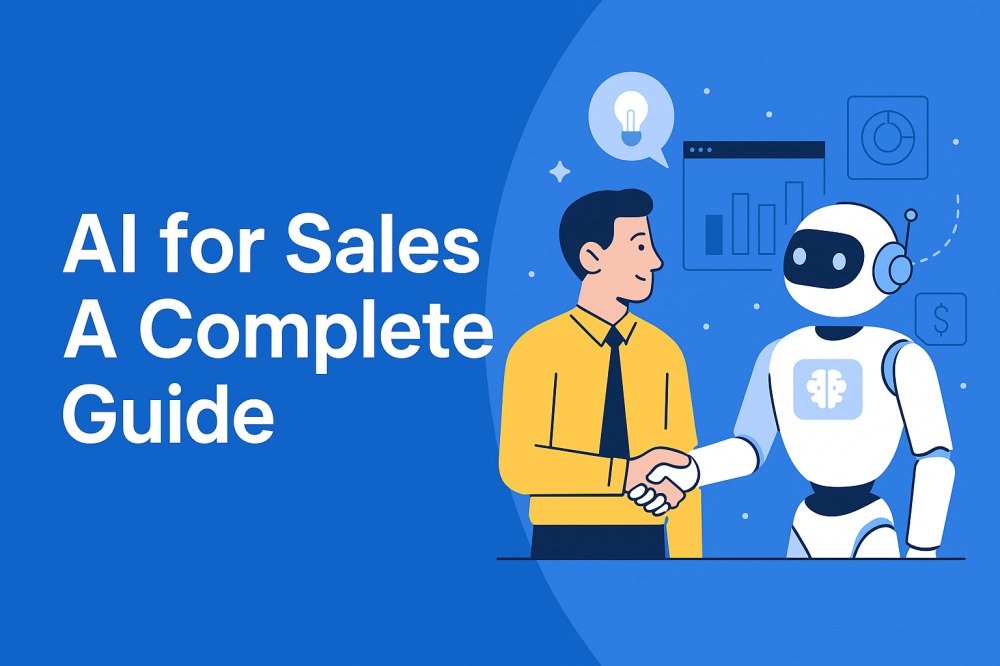The sales process has changed over the years as buyers now expect faster answers and personalized experiences at every step. With the arrival of AI, previously used cold calls and lengthy, boring emails are trending. This article will explain how AI for sales improves business communication and ensures more conversions. Furthermore, we will discuss the top AI tools that can assist with sales and future projections about this technology.
What is AI for Sales?
Artificial intelligence in sales means using computer programs that can not only learn but also analyze data and make decisions to help sales teams. These LLM models use sophisticated systems like NLP to interpret large amounts of data to find patterns that humans might miss. In this way, they can find which leads are most likely to buy while also helping with writing personalized emails.
With machine learning algorithms, these agents can be integrated with customer relationship management tools and automate sales tasks. AI in sales also helps with finding hot leads and answering user questions without human help. Teams now use AI for data analysis to find customer behavior trends and suggest the best times to reach out. Similarly, custom AI agents also assist with specific tasks using behavioral analytics.
Benefits of Implementing AI in Sales
Like all other fields, applying AI in sales and marketing offers various benefits and helps achieve goals quickly. Along with that, you can go through the following benefits of using artificial intelligence for sales purposes:
- Lead Prioritization: AI studies past data to understand which types of leads usually buy products or services. It then performs behavioral analytics and scores and ranks new leads based on the results to ensure hot leads are targeted first.
- Personalized Messaging: Since these models use NLP and have contextual understanding, they write unique messages that match each lead’s interests and actions. With these tools, teams can send better emails to hundreds of people without losing quality.
- Sales Forecasting: Many teams now use AI sales prospecting, as they analyze trends and customer habits to make accurate predictions.
- Task Automation: AI can handle tasks like data entry and call scheduling to save time and resources. This gives sales reps more time to focus on hot leads and ensure they convert to customers.
- Coaching and Insights: Due to better data analysis, artificial intelligence can listen to calls and check emails to give real-time feedback. As a result, managers can use this data to improve team performance and apply tactics that generate better results.
Types of AI in Sales
Depending on the purpose of the sales campaign, many AI types exist that help with regulating interactions and increasing revenue. We have shared a few of these types in the following sections, which will help you better understand how to use AI in sales:
1. AI for Sales Prospecting
Tools that are trained for sales forecasting help identify potential leads by analyzing digital behavior and demographic information. Such AI models use machine learning and predictive analytics to scan websites and emails for buying signals. Similarly, tools like ZoomInfo and LeadIQ use firmographic filters and keyword tracking to rank prospects. Hence, using such AI for sales reduces time spent on cold leads and increases conversion chances.
2. AI Chatbots with NLP
With the help of NLP, chatbots can start conversations and help visitors through the sales process. Tools like Drift and Intercom provide chatbots that understand customer questions and provide product recommendations. So, they collect data and book meetings without human help. Since they automate early-stage interactions, these AI tools for sales move qualified leads further down the pipeline.
3. AI-Powered Email Generation
AI email writers use large language models, such as GPT-4 and Gemini, to create personalized sales messages and follow-ups. Since they have contextual understanding, they can see past conversations and customer history for customized and targeted messages.
Platforms such as Lavender and Regie.AI generate content that adapts tone and context according to customer data. Additionally, the AI in sales analyzes email performance metrics to optimize subject lines and CTAs.
4. CRM-integrated AI Assistants
Users can get CRM services that come with AI-powered assistants. Salesforce and HubSpot come with AI assistants that can automate data entry in addition to cleaning contacts and surfacing relevant insights. Additionally, these assistants use machine learning to detect and deal with risks and remind reps to follow up. They can summarize notes and assign lead scores based on past interactions.
5. Voice and Sentiment Analysis
AI voice analytics tools such as Gong and Chorus.ai transcribe sales calls and analyze tone and emotional cues. Using NLP and acoustic processing, they detect hesitation or interest during conversations and proceed accordingly.
Similarly, these insights help managers identify what top performers do differently and where reps lose momentum. When using such AI for sales, it increases close rates and ensures sales reps communicate persuasively.
Top 5 AI in Sales Tools
Considering the improvements that artificial intelligence brings to sales, many tools now exist in the market. A few AI tools for sales and marketing that are leading the race are shared below:
1. HubSpot Sales Hub
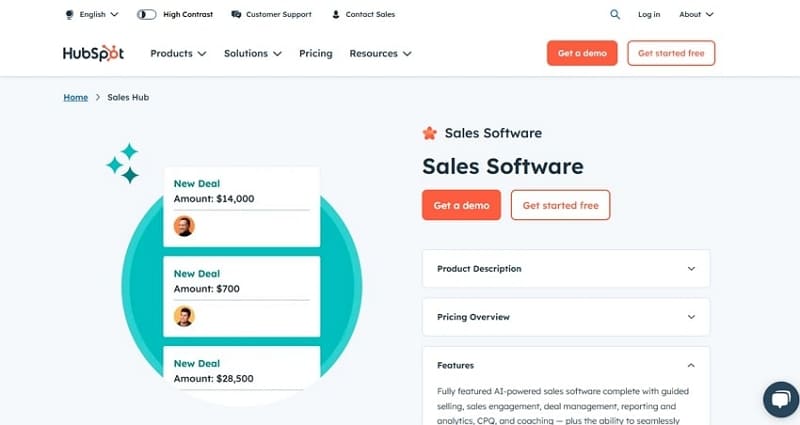
Sales Hub uses AI to automate lead scoring, in addition to email writing and meeting scheduling within its CRM. Its Breeze Customer and Prospecting agent answers prospect questions, and autonomously researches leads for personalized outreach. Furthermore, its deal management tools are AI-powered and guide agents about ideal actions for closing deals. Similarly, it offers AI-powered projections in addition to meeting scheduling and guided selling solutions.
2. Salesforce Einstein
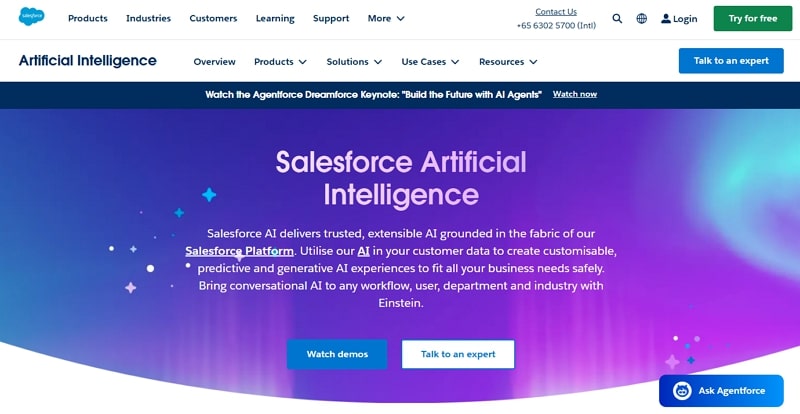
Salesforce Einstein brings advanced AI in sales and marketing directly into the Salesforce platform to support smarter selling. The Einstein AI agent writes emails and summarizes calls to provide insights for better conversations. Moreover, it allows bringing your own models to its ecosystem to customize the sales process further. On the customer service side, its Agentforce AI allows customers to converse directly with AI to resolve issues.
3. Gong.io
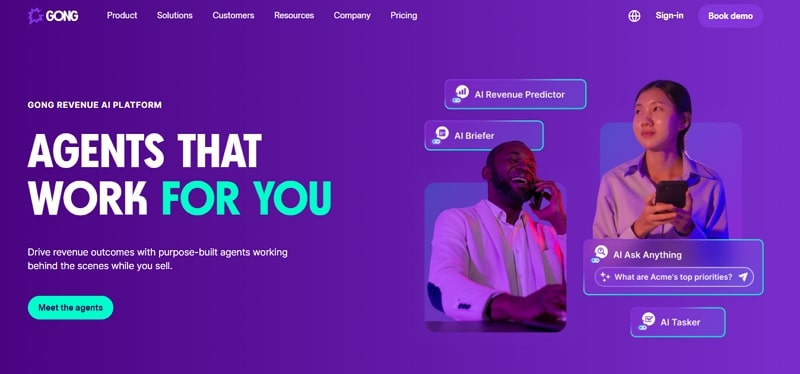
The platform uses voice recognition and ML algorithms to analyze calls and virtual meetings between sales reps and customers. Specifically, its Gong Engage assists with prioritizing and personalizing customer engagements. Additionally, it provides over a dozen AI tools for sales and agents, such as Deal Reviewer and Briefer, to help teams achieve revenue growth. The Gong Data Engine also helps with automating data, capturing, and mapping across the revenue streams.
4. Outreach
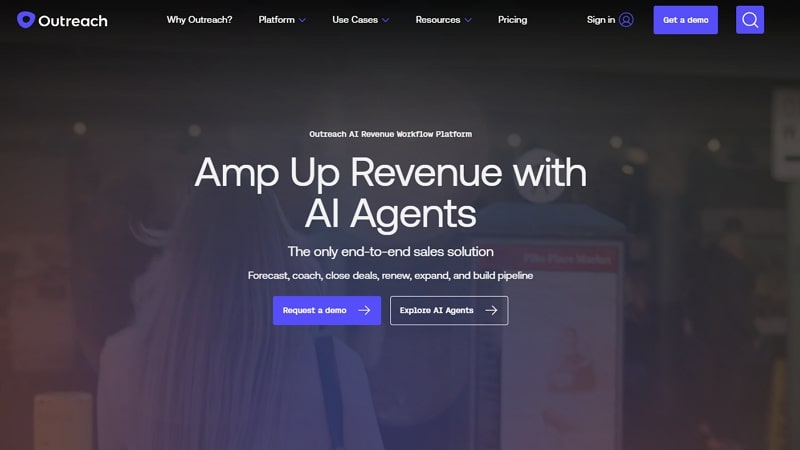
Outreach uses AI for sales tasks, such as managing sales sequences and improving customer communication. Its AI agents reduce forecast prep time by 44% and help with building stronger revenue plans with flexible forecasting. In addition, it increases the qualified pipeline by 15% by ensuring proper communication and scheduling timely meetings. Equally, using contextual awareness, the AI understands true buyer sentiment and shares it with the team for better results.
5. Salesloft Drift AI
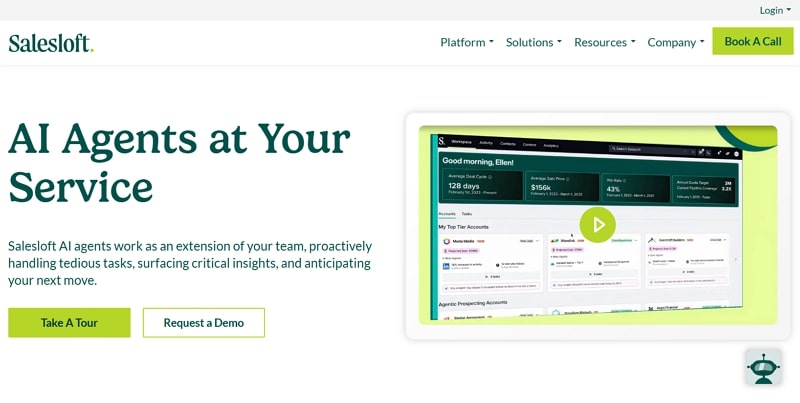
The platform specializes in real-time conversational marketing, especially in engaging visitors to your site or store. It takes advantage of a defined criterion and artificial intelligence in sales to prioritize leads. Afterward, it directs the potential leads to the representatives to close the deals. Furthermore, users can integrate their AI capabilities with other CRM systems to move conversion data and analyze the impact on the overall sales process.
Use Cases of AI in Sales
The primary objectives and targets of the sales process determine how you will use AI in sales prospecting and other things. Apart from that, the following use cases will help you understand their need better:
- Lead Qualification: AI helps qualify leads by analyzing behaviors and previous interactions to understand buying intent. Similarly, it gives each lead a score to help sales teams focus better and reduce the time spent on uninterested leads.
- Sales Email Writing: Artificial intelligence tools can write personal emails by analyzing customer interests and using contextual awareness. These AI agents chose the right wording and email timings to increase open rates based on the previous data.
- Call Analysis: Such tools use AI records and study sales calls to identify patterns in keywords and customer reactions. In this way, it shows where conversations succeed or fall flat based on real data.
- Personalized Selling: AI builds tailored sales messages by using data from past purchases and browsing habits. Afterward, it adjusts the pitch for each customer based on unique behavior and even suggests relevant products.
- Churn Prediction: These tools detect warning signs that a customer might stop buying by watching the engagement levels and service complaints. Additionally, they alert sales agents before it’s too late to act and provide relevant information to win back unhappy customers.
What is the Future of AI in Sales?
Since AI is continuously growing, its implications for the sales process and effectiveness in converting leads will also increase. In fact, predictions suggest it will automate 60% of sales tasks by 2028, as compared to 45% just 2 years ago. Its benefits are already evident, as companies are reporting 3 to 15 percent revenue growth and 10 to 20% ROI gains by using artificial intelligence in sales.
These statistics prove the importance of having your own AI-powered sale agents that are specifically trained for sales tasks. Platforms like ZEGOCLOUD are actively engaging with sales teams and businesses to help them build custom AI sales agents. Its Digital Human technology with ASR and Text-to-Speech supports realistic conversations using previous data. Plus, the service allows real-time API control, which helps with adjusting the agents’ flexibility for sales funnels.
Conclusion
To conclude, businesses are using AI for sales as it helps with improving customer engagement and lead conversion. With benefits like sales forecasting and task optimization, businesses save lots of resources by saving time and following hot leads. CRM platforms like HubSpot and Salesforce come with built-in AI features to help with sales funnels. Similarly, businesses can use ZEGOCLOUD conversational AI for custom AI agents for sales purposes.
FAQ
Q1: How can AI be used in sales?
AI can be used to automate lead scoring, personalize outreach, forecast revenue, and handle customer queries through chatbots. It also helps sales teams prioritize high-value opportunities and reduce time spent on repetitive tasks.
Q2: Which AI is best for sales?
The best AI for sales depends on your use case. Tools like HubSpot AI and Salesforce Einstein are great for CRM automation and insights.
Q3: Will AI replace salesmen?
No, AI is designed to assist—not replace—salespeople. It handles routine tasks and data analysis, allowing human sales reps to focus on relationship-building, strategy, and closing deals.
Let’s Build APP Together
Start building with real-time video, voice & chat SDK for apps today!









